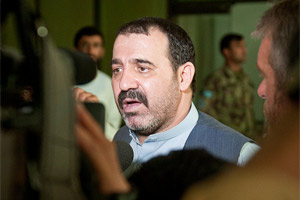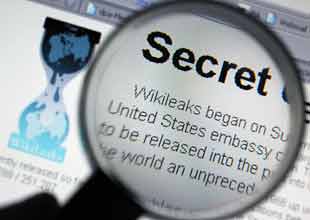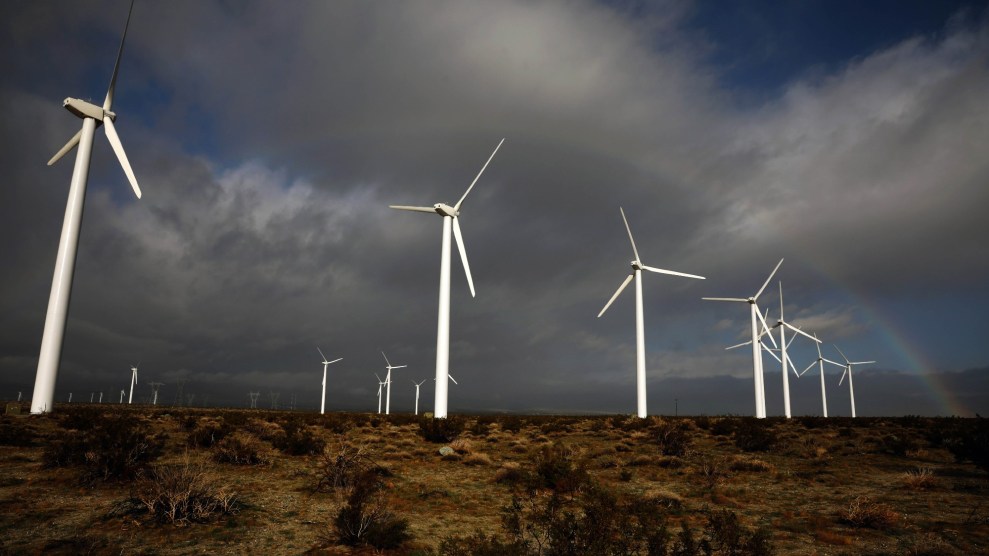
— US Navy photo by Petty Officer 1st Class Mark O’Donald.
Despite widespread allegations about his involvement in Afghanistan’s drug trade and other illicit activities, the US government has never taken steps to prosecute Ahmed Wali Karzai, the younger half-brother of the Afghan President—though a leaked diplomatic cable suggests American officials may have come very close.
This revelation was contained in one of a series of Afghanistan-related communiqués released by WikiLeaks on Thursday. The document in question is a confidential summary of a February 4, 2010, meeting of an interagency group known as the Nexus-Corruption Leadership Board. The board—which was co-chaired by Kabul embassy official Earl Anthony Wayne and Major General Michael Flynn, then the top military intelligence official in Afghanistan—had convened to review potential anti-corruption measures. Specifically discussed were “possible courses of action (‘COAs’) that U.S. military and Embassy personnel may employ against criminal and corrupt Afghan officials in an effort to change their behavior.” During the meeting, board members agreed to “apply a set of minimum COAs against high-profile corrupt officials to signal a change in U.S. policy on corruption” and to “begin a series of high-level demarches to persuade the Karzai government to follow through on promises to tackle corruption.”
But there was also a more politically fraught matter on the agenda: “possible law enforcement actions, against three prominent Afghan malign actors in southern Afghanistan” including Ahmed Wali Karzai, who is a key powerbroker in the Kandahar region. Along with AWK, as he’s widely known, the board also singled out a colonel in the Afghan border police named Abdul Razziq (the Washington Post recently dubbed him “The Afghan Robin Hood”) and Asadullah Sherzad, the chief of police in Helmand Province.
The cable noted that the embassy’s Nexus Corruption Coordination committee—which develops anti-corruption policy recommendations—and NATO’s Anti-Corruption Task Force would soon meet to “consider intel and law enforcement files assembled on” each of the officials. The groups would then make a “joint policy recommendation on how these officials should be addressed, taking into consideration second and third order effects”—that is, the potential blowback of taking down Karzai’s brother and the others.
According to the cable, there was reason to act quickly: “Given the fluidity of developments on the ground (e.g., rumors of Ahmed Wali Karzai’s appointment as Ambassador to Saudi Arabia or Oman, and Abdul Razziq’s initiative to form an anti-corruption task force in Spin Boldak), the time is right to determine an appropriate policy for dealing with such officials.”
In the trove of cables released by WikiLeaks, there’s no record of what transpired at future meetings. But one thing is clear: Whether for lack of evidence, fear of alienating the Karzai government, or other reasons, the trio of Southern Afghanistan powerbrokers US officials had dubbed “malign actors” remain in place.
AWK, for his part, has vigorously asserted his innocence, claiming allegations of drug smuggling and graft have been concocted by political enemies to weaken the Karzai government. (According to one cable, he even offered to take a lie detector test to prove his innocence.) But the WikiLeaks cables paint the clearest picture yet of how widely AWK is mistrusted by US and international officials (including Ambassador Karl Eikenberry), who nevertheless believe they have little choice but to engage with him. (Though AWK denies it, he is also reportedly on the CIA’s payroll, which, if true, further complicates matters.)
Along with AWK, the cables also depict his half-brother, Hamid Karzai, in a less than flattering light. The Afghan president is portrayed as weak, insular, and unpredictable, charming one minute and despondent the next. A March 2009 cable relays one Afghan official’s assessment of Hamid Karzai as a “‘lonely and alone man’ who suspects his inner circle is leading him in the wrong direction, but does not know who else to trust. The president pays significant attention to the mostly negative media coverage of his government—behavior that reinforces his suspicions that enemies are ‘out to get him.'”
Afghan-US relations have been strained for months, and the candid views expressed in the cables are sure to ratchet up tensions even further while likely heightening Karzai’s paranoia about his standing with US officials. Removing AWK from his Kandahar stronghold has long been a point of contention between the Obama and Karzai administrations. And though the US has consciously backed down on its criticism of AWK in recent months, the leaked cables could revive this sore point, since they suggest that AWK’s continued role in Kandahar is a key source of instability. A December 2009 cable—which commented that “in a land of popular strongmen, AWK is widely unpopular”—described just how entrenched the president’s half-brother had become in the political fabric of Kandahar and outlined his methods of consolidating power:
As the kingpin of Kandahar, the President’s younger half-brother, Ahmed Wali Karzai, rules over political deal and decision-making at the provincial level and thereby dominates access to economic resources, patronage and protection. The overriding purpose that unifies his political roles as Chairman of the Kandahar Provincial Council and as the President’s personal representative to the South is the enrichment, extension and perpetuation of the Karzai clan, and along with it their branch of the Popalzai tribe. This applies equally to his entrepreneurial and his alleged criminal activities. AWK derives authority and legitimacy from his relationship to President Karzai, from the relative discipline and elite position of the Popalzai tribe and from his access to resources. In Kandahar’s political realm, he is an unrivaled strongman.
The cable goes on to describe the catch-22 of prosecuting allegedly corrupt officials, and previews some of the issues that surely arose when, just a few months later, US diplomats and military officials hashed out whether to take criminal action against AWK. “Bringing to justice major corrupt figures or negative influences in Kandahar contain a serious dilemma: they would include some of Karzai’s closest relatives and allies and require the prosecution of people on whom we often rely for assistance and/or support.”














